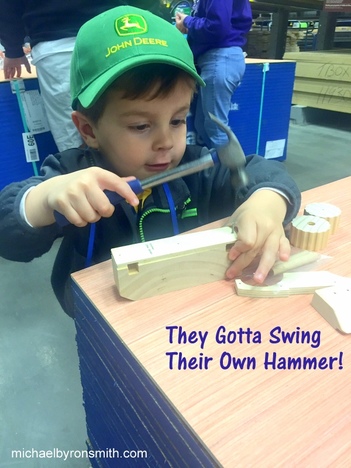 Photo by Rachel McCarthy
Photo by Rachel McCarthy One area where we struggle mightily as parents is when, where, and how much do we help our children. I discuss this question in Chapter 10 of my book, “The Power of Dadhood: How to Become the Father Your Child Needs”. Here I suggest a key question to ask yourself when faced with these decisions.
Hopefully, you will forever be helping your children, from learning to walk, to going to college, to possibly buying a home. Let’s face it, they need help. But some parents give their children way too much help. So much help that sometimes it renders them helpless, lazy, or feeling entitled.
Parents aren’t always aware of just what they are doing. We all want our children to succeed and to have all the advantages to do so. In our haste and desire for them be happy, and because our hearts are so entwined with there’s, we don’t always think logically and become ‘saviors’ too quickly. But there is no long-term advantage gained by anyone who takes a shortcut or receives special treatment. Your child will not get stronger if you lift their weights for them. They will not learn if you do their homework. They will not know how to handle problems if you always come to the rescue.
The way to really help your children is to give them tools. The most simplistic example is a boy who wants to build a birdhouse. You can help him by giving him a hammer, but don't swing it for him. He has to swing his own hammer! Your son must do the work to get anything out of it, including confidence and self-satisfaction. But you can give him some pointers (education).
Tools you can provide that help are:
1) An atmosphere for learning,
2) An education,
3) Encouragement,
4) Respect, both ways and,
5) Discipline.
Some things parents do that will not help, and actually hurt their children’s development are:
1) Making excuses for them,
2) Never enforcing consequences for bad decisions,
3) Inconsistent rules,
4) Not allowing them to struggle and,
5) Covering up their mistakes.
What is the key question, previously mentioned, that I suggest you ask yourself before helping your children, no matter their age? It is in Chapter 10, “Building Strong Children”. “Will my help make them stronger or weaker?” It is a simple question with an often difficult answer. But by asking this question, you will be considering not just the moment at hand, but the impact on your child’s overall development.
Just today I was watching my one-year-old granddaughter struggle to stand up from a slightly awkward position. I started to help her but stopped because I wanted her to learn to get up on her own, to have a simple but important victory, and she succeeded. Confidence is earned, not given. Love is not helping, when the help will adversely affect their confidence and aggressiveness. Thinking before parenting is always a good idea!
Thank you for reading!





